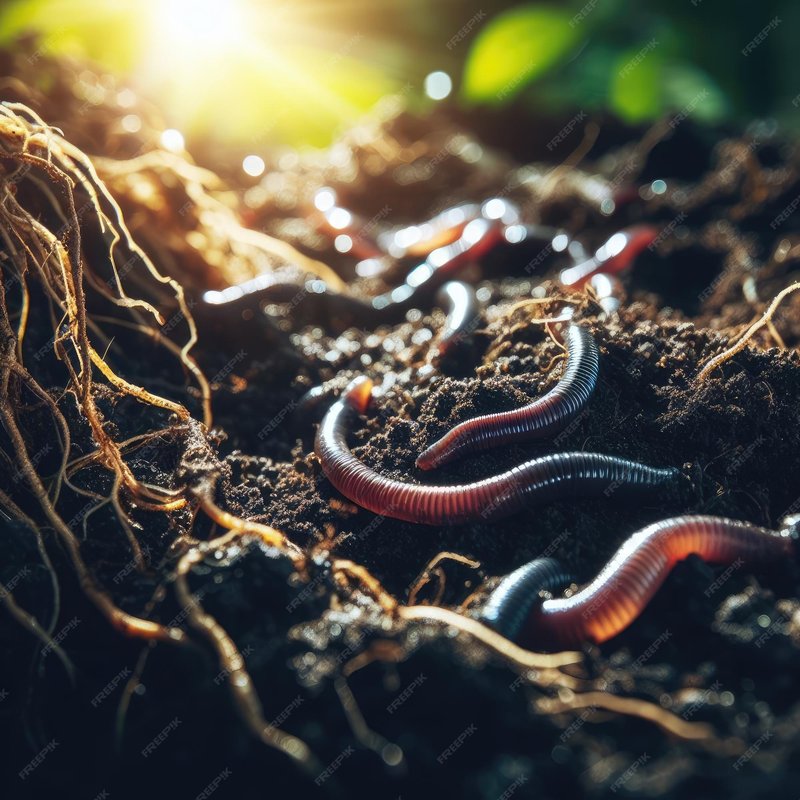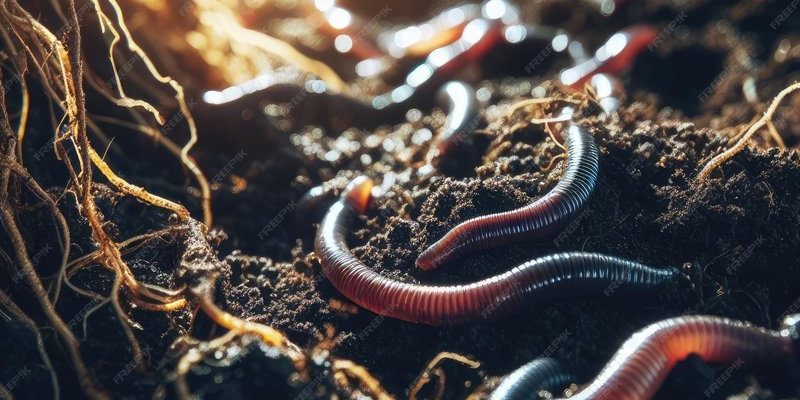
Earthworms have a special relationship with microbes. They work together like the best of buddies in a symbiotic dance. As earthworms process organic matter—think leaves, grass clippings, and even some types of waste—they break it down and create a rich, nutrient-dense environment for microbes to flourish. In today’s article, we’ll dig deeper (pun intended!) into how earthworms impact soil microbial life and why this matters for our gardens, farms, and even ecosystems as a whole.
How Earthworms Enrich Soil
Earthworms are often referred to as **nature’s plow**. They travel through soil, creating tunnels and burrows that not only improve *aeration* but also facilitate water drainage. This is essential for plant roots and the microbes that live in the soil.
When earthworms consume organic matter, they break it down into smaller particles. This process releases nutrients like nitrogen, phosphorus, and potassium—key elements that plants need to grow. To put it simply, earthworms help to turn waste into food. The castings, or worm poop, they leave behind are packed with nutrients in a form that’s easy for plants and microbes to use.
Beyond just nutrient cycling, earthworms also influence soil structure. Their burrowing habits help form aggregates, which improves water retention and creates more spaces for microbes to inhabit. Think of it as building small apartments for bacteria and fungi!
The Role of Microbial Life in Soil Health
So, why all this fuss about **microbial life**? Well, soil microbes are like the unsung heroes of the soil ecosystem. They perform essential tasks, including decomposing organic matter, fixing nitrogen, and aiding in nutrient cycling. Without them, our soil would be lifeless and unable to support plants.
Microbial communities consist of a diverse range of organisms, including bacteria, fungi, and protozoa. Each has its unique role. For example, certain bacteria help break down tough organic materials, while fungi form partnerships with plant roots, helping to absorb water and nutrients. When earthworms come into play, they create a welcoming environment for these microbes to thrive, establishing a rich tapestry of life underground.
Moreover, a healthy microbial community can improve soil resilience against diseases and pests. When the balance is right, plants are less likely to suffer from issues like root rot or nutrient deficiency.
Earthworm Activity and Microbial Diversity
You might be wondering, “What does earthworm activity have to do with diversity among soil microbes?” Well, it turns out that earthworms can enhance microbial diversity by changing the soil’s physical and chemical properties.
First off, as they break down organic material, earthworms create a variety of microhabitats. Some microbes prefer the moist environment of worm castings, while others thrive in the aerated soil that results from worm burrowing. This variety supports a wider range of microbial species, creating a more robust ecosystem.
Secondly, earthworms’ digestion processes release organic compounds, which can act as food for microbes. This food web supports numerous microbial species, enhancing their ability to perform crucial functions like decomposition and nutrient cycling. In essence, more earthworms often mean more microbial diversity, which is fantastic for soil health.
How Earthworms Improve Soil Activation
Soil activation refers to the process of making soil more “alive” and functional. Earthworms are key players in this process. Not only do they help in breaking down organic matter, but they also stimulate microbial activity through their movement and feeding.
When earthworms burrow, they physically mix soil layers. This mixing helps distribute nutrients and microbes throughout the soil profile, ensuring that they’re not concentrated in one area but available to plant roots across a broader range.
Additionally, the way earthworms excrete castings enhances microbial life. These castings contain beneficial microorganisms that can help with soil health. Essentially, earthworm castings are like a gourmet meal for soil microbes—rich in nutrients and ready to support plant growth.
The Connection Between Earthworms and Plant Growth
It’s hard to overstate how much earthworms benefit plant growth. By fostering a thriving microbial community, they help plants absorb nutrients and water more efficiently.
When plants grow strong and healthy, they’re more resilient to pests and diseases. Imagine your garden flourishing, with vibrant flowers and sturdy vegetables. This is often thanks to the hard work of earthworms and the microbial life they support.
Furthermore, the nutrients released by decomposing organic matter attract more beneficial insects, creating an ecosystem that promotes balanced plant growth. Think of earthworms as the ultimate gardeners, working silently beneath the surface to ensure everything thrives above ground.
Challenges Facing Earthworm Populations
Unfortunately, despite their significant role in soil health, earthworm populations face many challenges. Urbanization, pesticide use, and climate change can harm these vital creatures.
For example, when landscapes are developed, their natural habitats are destroyed. Pesticides can also affect earthworm health directly, reducing their populations and, consequently, their beneficial impact on microbial life.
Moreover, climate change affects soil moisture and temperature, which can further strain earthworm populations. This can create a ripple effect—fewer earthworms lead to less microbial diversity, which in turn impacts soil health and plant growth.
How to Encourage Earthworm Populations in Your Garden
The good news is there are many ways you can help encourage earthworm populations in your garden! Here are some simple steps:
- Use organic matter: Adding compost or mulch creates a rich habitat for earthworms.
- Avoid pesticides: Reducing or eliminating chemical pesticides helps keep earthworms safe.
- Maintain moisture: Earthworms thrive in moist environments, so ensure your soil has adequate water.
- Practice no-till gardening: This method protects earthworm habitats and allows them to thrive.
- Include diverse plants: Having a range of plants creates various organic matter that earthworms love.
By making these changes, you can help support earthworm populations and, in turn, the all-important soil microbial life.
In summary, earthworms may be small, but their impact on soil microbial life is huge. They enhance nutrient cycling, boost microbial diversity, and promote healthy plant growth—all while working quietly beneath our feet. By understanding their role and encouraging their populations, we can foster healthier ecosystems, whether in our gardens or on a larger scale. So, the next time you spot an earthworm, remember: they’re doing much more than wiggling around— they’re busy building a better world for us all.

